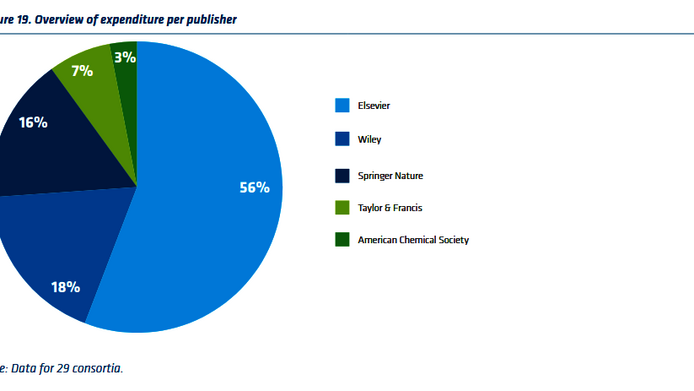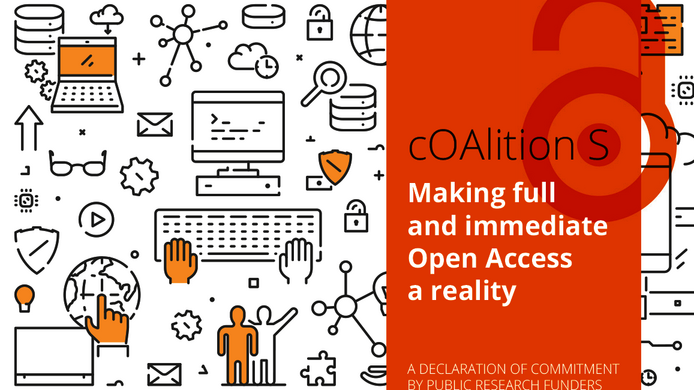The end of the paywall in science

For some time now, there have been rumblings in the academic publishing industry, and they have grown loud enough for the wider public to realise that there is a need for structural change in this field. The main reason is that the scholarly publishing sector has seen the emergence of near-monopolies in the last few decades. This is not surprising given the enormous growth of the market for research publications over the same time. The number of scholarly publications is now doubling every nine years, and the market is dominated by a handful of large commercial publishing houses whose profits have been soaring. Among these internationally active groups are names such as Elsevier, Wiley-Blackwell and Springer Nature. The latter publishes Nature, one of the most widely known science journals that enjoys excellent international standing.
Monopolisation and paywalls
Because publishing in widely recognised journals is a must for any successful career in science, publishers wield significant power and often control the output of publicly funded research – this is present the state of affairs. But the scholarly community has begun to question this model. Criticism has grown vocal because the publishing houses get the publications, including exploitation rights, free of charge. Moreover, researchers perform quality control services for the publishers in peer review processes, also without remuneration. And finally, research institutions pay large sums to the publishers, either for access to publications or for their publishing services. Costs in this area have been seen to rise significantly faster than the general inflation rate. A recently published research study of the European University Association (EUA) found that universities and other research institutions from 30 European countries are paying more than a billion euros annually for journals, with most of the money going to large publishing houses. The actual amounts may be significantly higher, since the study did not capture all payments made. Access to this knowledge is possible via public libraries, but quick online access is virtually unaffordable for individuals. Big Deals: Overview of costs per publisher
The scholarly community develops new models
Apart from these cost-intensive and often opaque “closed circles” of knowledge production, several non-commercial publication models have come into being in recent years, often established by scholars who founded Open Access journals of their own. One example is “SciPost”, which was founded by Jean-Sébastien Caux, a physicist who lives and works in Amsterdam. Viennese quantum physicist (and recipient of the 2015 FWF START Award) Marcus Huber co-founded the Open Access journal “Quantum”, and researchers in the UK banded together to establish the Open Library of Humanities (OLH) in 2015, a not-for-profit organisation that promotes free access to scholarly publications in the humanities. Many of these initiatives were launched by young researchers – even though they were putting their reputations at risk by not publishing in widely recognised journals. But they prefer to depart in new directions, challenging a system that is increasingly placing authors, the creators of intellectual property, at a disadvantage.
FWF and Austria are well-positioned
Along with other Austrian institutions, FWF has been promoting open access initiatives for many years and in all academic disciplines. In 2018, FWF provided 3.3 million euros in funding towards publishing expenses. Moreover, FWF has worked closely with Austrian libraries to negotiate transformative agreements with publishers, and has successfully concluded such agreements with major players including Springer, Wiley Blackwell and Taylor & Francis, making open access publication much easier for authors.
A trailblazer for Open Science For many years, FWF has been pursuing one of the most effective Open Access strategies among funding organisation, says a European study published in 2015. Today 92 per cent of publications resulting from FWF-funded projects are freely available thanks to the implementation of purpose-built funding policies by FWF. Open Science has been an FWF goal since its establishment in 1968, a commitment that is reflected in the fact that funding for publishing and printing has regularly been made available through FWF’s programmes.
Open access to scholarly knowledge is an important contributing factor for openness and transparency in all academic working cycles. It ensures that research outcomes and methods are fully understood and can be reproduced, criticised and developed further. Moreover, both the scholarly community and society at large are economically and ethically entitled to free access to scientific knowledge – the former because it produces research results and engages in research quality assurance, the latter because it supports research and development. To ensure open access, we have to promote infrastructures and services that are controlled by researchers. With institutional funding – for example, by providing a given amount per year – we can ensure a measure of sustainability and budgetary predictability, creating efficient, fair and cost-transparent alternatives to the (subscription) models of large commercial publishers.
A plan and big ambitions
Together with Austrian research institutions, FWF has taken steps in recent years to prepare the ground for the cultural shift that is due in academic publishing (see "The story so far"). Now we are launching “Plan S” to see this process through. Plan S is based on a decision taken by the European Union in 2016 to align various Open Access policies and models now in place. It was first presented in late 2018 by the initiative cOAlition S, a platform of more than 20 international research organisations that work together to support implementation of the plan. The main goal of Plan S is that all research papers arising from projects funded by the public or by non-profit organisations shall be made available as open-access publications by 2021.
Based on a ten-point-proposal by the initiative, an intensive debate has taken place over the last few months. Advocates and critics of the plan were invited to participate in a feedback process, the results of which were integrated in the final version presented on 31 May 2019. With respect to research papers and scholarly publications arising from FWF-funded projects, Plan S means that they will be freely accessible without delay, i.e. upon publication, in the future. Implementation will begin with papers published around year-end 2021.
A new era has begun
In summer 2017 FWF placed Open Science on the agenda of the European Forum Alpbach. International experts discussed the changing environment and the effects of privatisation and commercialisation on the scholarly community. The talks at Alpbach proved once again that academic research enjoys strong public interest and support, provided that it is seen to work first and foremost for the benefit of society at large. There is broad consensus within the scholarly community favouring Open Access and Open Science. Cost transparency, framework conditions and services in the publishing sector are important factors in this respect, forming the basis on which open access to research data has to be ensured. This will be the next challenge to confront, as the growth of knowledge and the management of research data will require new quality control tools. FWF has recently adjusted its policy accordingly, requiring researchers to disclose the data resulting from their projects to the extent that such disclosure is compatible with legal and ethical norms and standards. FWF continues to see itself in the role of trailblazer and supporter along the way towards open access to publicly funded research, working to make the benefits of scholarly insights available to the whole scholarly community and the general public.
Falk Reckling is Head of the Department of Strategy - Policy, Evaluation, Analysis at the Austrian Science Fund FWF. He is in charge of strategic affairs, research statistics and documentation as well as scholarly communication to promote a transparent and widely accessible publication system.
The story so far – 15 Years of Open Access Policy
- FWF was among the first signatories supporting the 2003 Berlin Declaration on Open Access to Knowledge in the Sciences and Humanities, one of the founding documents of the international Open Access movement.
- In 2004 FWF adopted its first Open Access Policy.
- Open access is introduced at first on a voluntary basis; in 2008, it is made mandatory for all peer-reviewed publications.
- In 2012, FWF and UNIKO (Universities Austria) founded the platform OANA (Open Access Network Austria) for the advancement of Open Access and Open Science.
- In 2013, FWF started providing data on its publication expenses on the online portal Zenodo. Additionally, the data is integrated in an Open APC dataset to facilitate international cost monitoring. FWF has spent a total of EUR 16.9 million on funding for 8,211 publications (not including books) over the last five years.
- FWF’s Open Access Policy was modified in 2014 with a focus on the quality assurance standards of providers. Now FWF supports only publications that are freely accessible from the date of publication.
- In 2018 FWF supported the open access initiative cOAlition S, which has proposed “Plan S” to achieve complete and immediate free access to research results.
- The most recent update of the FWF’s Open Access Policies has been conducted in early 2019. It makes open access to research data mandatory, provided this is legally and ethically acceptable as well as technically feasible.
- cOAlition S publishes the revised guidelines for the implementation of Plan S on 31 May 2019. Plan S applies to all research projects submitted to the FWF from 1 January 2021.
Further reading > Open Access – final version of Plan S published > Open Access publication models > Transformative agreements in Austria > The “gold route” to Open Science







